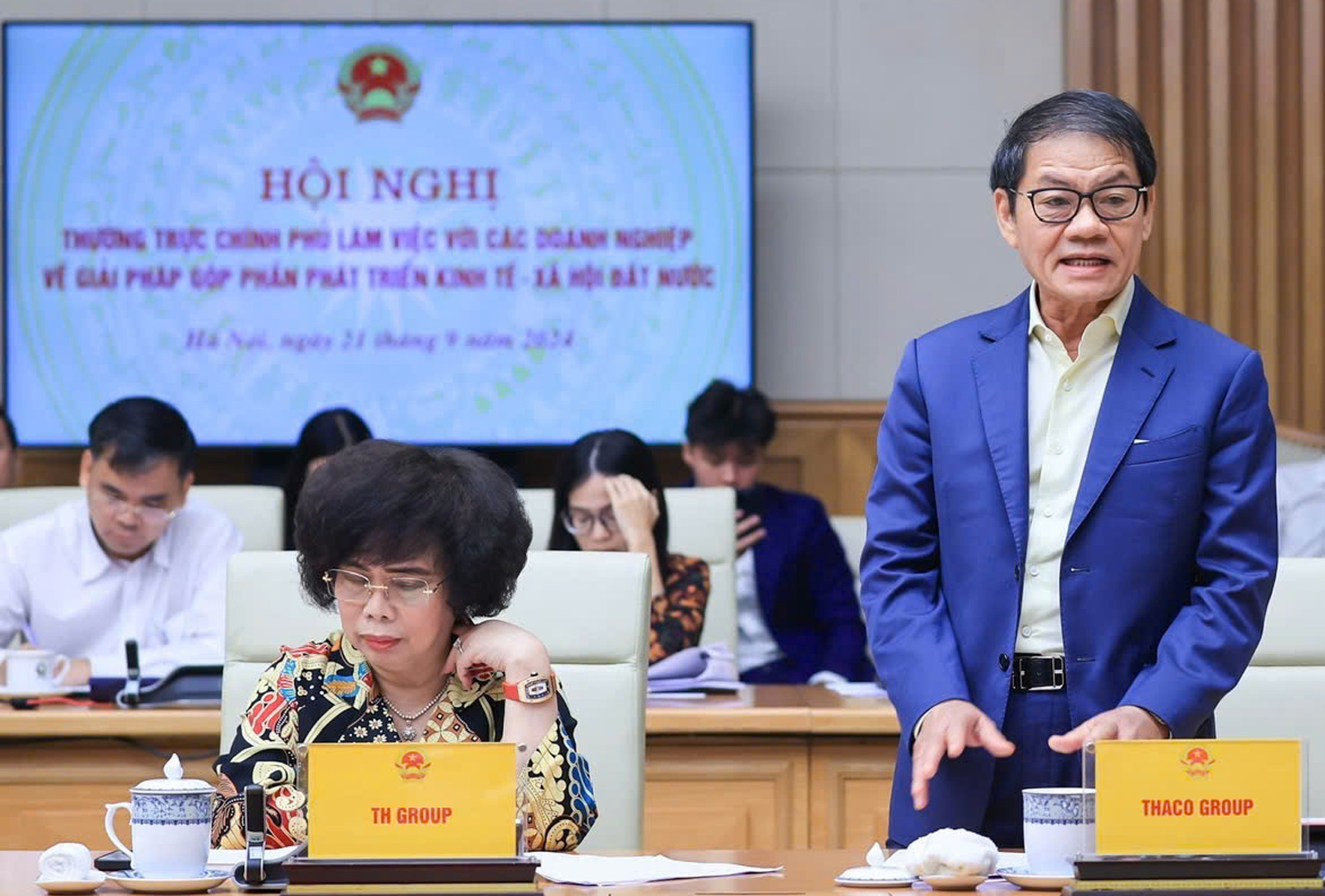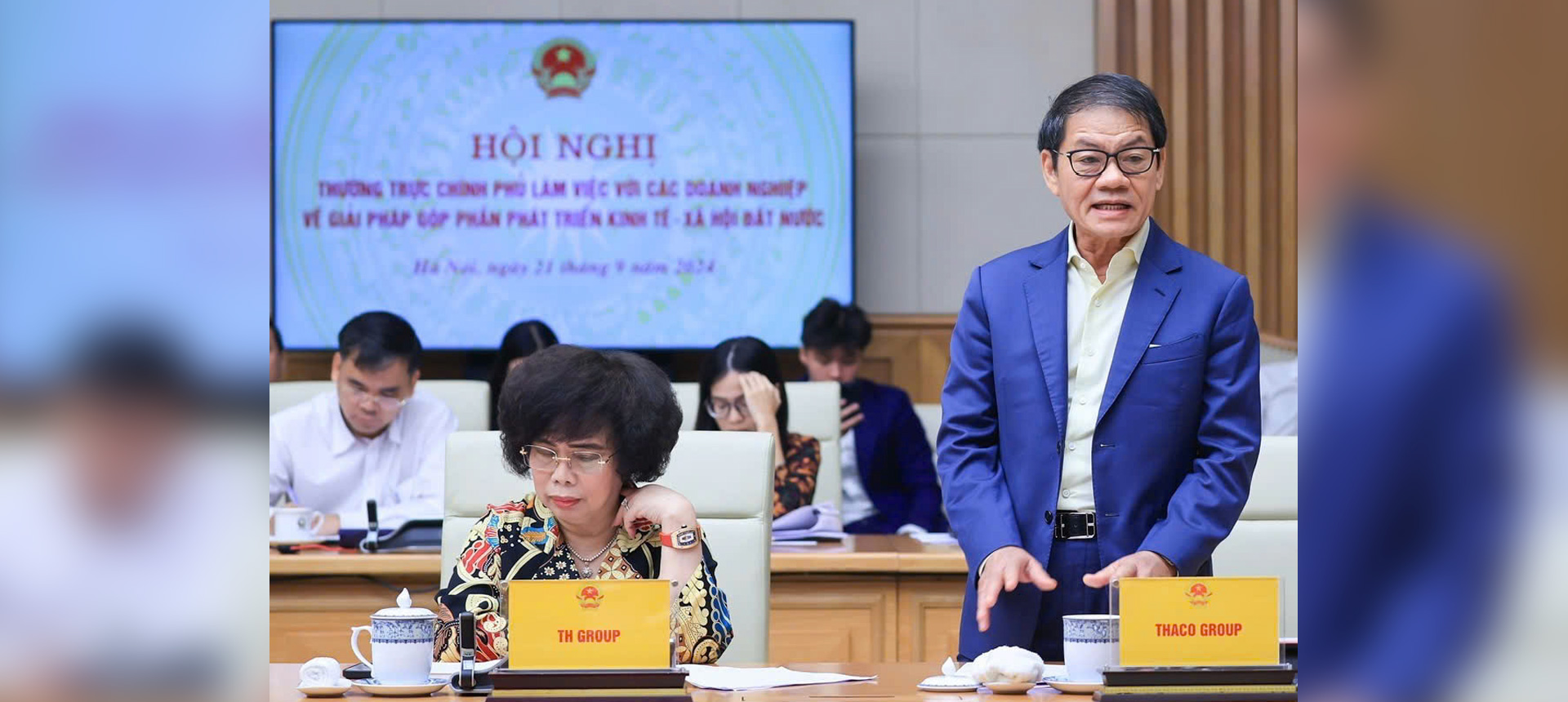Speech at Government Meeting by THACO Chairman
On September 21, Prime Minister Pham Minh Chinh chaired the Conference "Government & Private Business Exchange to address challenges, foster pioneering initiatives, and actively participate in large-scale investments, contributing to socio-economic development". THACO Chairman Tran Ba Duong attended the event and presented his speech.
Good morning Mr. Prime Minister,
Government agencies,
Ladies and Gentlemen,
I'd like to provide a concise overview of THACO's current production status, future plans, and investment recommendations, aligning with the conference's requirements. Our focus areas include: automotive manufacturing, mechanical engineering and supporting industries, logistics, real estate development, trade and services, and agriculture.
In the automotive sector, rapid technological advancements, particularly in electric vehicles, align with Vietnam's commitment to environmental sustainability as outlined in COP 26. We're establishing a domestic hub for international car brands, leveraging FTAs to boost exports, primarily within ASEAN. Due to technological changes, we're focusing on supporting domestic production of key components like body parts, interiors, exteriors, and especially electronic devices and digital platforms for enhanced vehicle intelligence and safety.
The automotive market, which reached 500,000 vehicles in 2022, experienced a significant decline to 300,000 in 2023 and may remain stagnant this year. Lower-priced cars below VND700 million continue to dominate sales, leading to a 50% drop in market value. This downturn poses challenges for strategic investments in supporting industries and new energy technologies.
We're investing in seven new automotive factories this year, with plans to add three more in 2025. This expansion will increase the local content rate for passenger cars to 45%, focusing on components and parts that Vietnam can produce efficiently and are less affected by technological advancements.
The transition to electric vehicles is inevitable, though it requires a strategic roadmap and significant investments in infrastructure to ensure safety, quality, and user convenience. While numerous car manufacturers partnered with THACO are developing electric cars, Vietnamese sales remain limited, primarily focused on pilot initiatives to mitigate consumer risks. Hybrid cars, especially those with additional batteries, are currently a popular option, offering a range of 80-150km on electric power alone and significantly reducing fuel consumption. As Vietnam adopts Euro 5 emission standards, it's imperative to prioritize carbon reduction targets. Considering our automotive industry's strategy since 2014, including ASEAN integration in 2018 with zero tariffs and FTAs, it's time to address the pressing issue of automobile emissions.
Regarding green energy, the automotive sector's strategic development plan for 2030 and 2050, while focusing on engines and gearboxes, has not adequately considered the evolving landscape of green technologies. We propose organizing domestic and international seminars to gain a clearer understanding of market trends, including the distribution of various vehicle types from fuel-efficient gasoline cars to hybrid, plug-in hybrid, and fully electric options. A phased approach will help mitigate economic risks associated with rapid transitions. Moving too swiftly could lead to misalignment with market demands and insufficient electrical and safety infrastructure.
In the supporting industries sector, investments require a focus on output and technology. Supporting industries are widespread across various sectors, and THACO's early establishment of mechanical production has yielded significant results. In 2024, THACO exported nearly $140 million to FDI enterprises, which further contributed $20 million through their own exports. We've recently intensified efforts to protect our trade by carefully scrutinizing raw materials and components from China. Next year, we aim to double the output of our supporting industries. THACO is also developing a Mechanical Supporting Industries Park in southern Vietnam to cater to FDI companies seeking assembly and transfer operations. We envision producing 35-40% of the necessary details, components, and spare parts for these companies.
THACO's auto parts sales to domestic car manufacturers like Hyundai, Ford, Toyota, and Isuzu reached $13 million in 2024, with projected growth in the coming year. While the supporting industry sector lacks a clear strategy, discussions often revolve around semiconductors and new technologies. Participation in the global value chain requires time, and the mechanical sector's current reliance on skilled labor, even without extensive education, is a common reality in Vietnam's industrial landscape. We urge the government to consider this issue as an opportunity to develop Vietnam's foundational industry and boost exports.
THACO's agricultural strategy centers on large-scale, organic production and circular integration. We've acquired 84,000 hectares from HAGL Group and secured additional 6,000 hectares in Vietnam, Cambodia, and Laos. Government support has facilitated new projects. Investments include $1.3 billion in Cambodia, $790 million in Laos, and $750 million domestically. Domestic investment has been slower due to lengthy planning and approval processes. Laos and Cambodia serve as pilot regions for our integrated agricultural model.
THACO's agricultural exports reached $53 million this year, with domestic revenue totaling $67 million. We anticipate exports to grow to $300 million next year, and domestic revenue to reach $104 million. By 2027, upon completing our investments, we aim to achieve $1 billion in agricultural exports.
In Vietnam's Central Highlands, excessive forest retention is hindering agricultural development. Previous attempts to convert forests into rubber plantations proved inefficient due to low rubber prices, particularly on less fertile land, if productions cannot reach 2.3 tons per hectare. A more sustainable approach would involve integrating agriculture, livestock, and forestry in a circular model. This would address the challenges faced by agricultural production. Like durian, which despite individual efforts, were successfully exported last year.
In logistics, we're developing a hub in Chu Lai. THACO's existing infrastructure handles 5 million tons annually, primarily through container traffic. However, the current route serves only 30% external cargo as it still only accommodates 20,000-ton ships. Previously, the Prime Minister directed and we are ready to invest nearly VND4,000 billion for the new route. However, we are currently waiting for the Government to approve the plan and need this plan for the project to be implemented.
The volume of goods transported from Southern Laos to Vietnam is substantial, with minerals alone reaching 1 million tons this year and other goods exceeding 1 million tons. However, the deteriorating condition of Road 14D and the slow progress of Road 14E construction are hindering trade. To address these challenges, we've implemented two BOT projects and plan to connect Northern Cambodia, Vietnam's Central Highlands, and Southern Laos to major ports like Chu Lai and Quy Nhon, and neighboring provinces from Quang Ngai, Quang Nam. This would streamline trade for regions like Quang Ngai, where a furniture company currently exports 140 containers daily but incurs additional costs of 4.5 million VND per container due to transportation to Da Nang. The government should consider a more decentralized approach to central seaport planning, focusing on Western routes through Laos and Cambodia to ensure the efficient operation of all coastal ports. We urge the Ministry of Transport and the Government to reconsider these major changes and upgrade port infrastructure. As private port operators, we will only invest in projects with a high potential for return.
During the COVID-19 pandemic, THACO acquired the Emart supermarket system. We've established three modern hypermarkets and shopping centers in Vietnam. By the end of 2025, we plan to expand to six centers. Our long-term goal is to operate 16 systems by 2027, positioning THACO as a leading retailer in Vietnam alongside Aeon.
Furthermore, by 2025, once THACO has established a solid foundation in agriculture and generated a stable income, we plan to explore and bid on infrastructure projects in the coming years.
THACO is committed to social responsibility and has a dedicated annual plan. During the COVID-19 pandemic, we produced numerous ambulances. In response to recent natural disasters, we've applied our expertise in forest planting and sustainable housing design. Our experience rebuilding a village in Quang Nam province after a flash flood demonstrates our ability to create resilient communities. We plan to expand these efforts to the North, focusing on soil conservation through reforestation and the construction of durable, lightweight housing. On our farms, we're building 1,000 new houses to improve living conditions for our 60,000 workers. We will share our housing model and select promising projects for implementation.
Thank you very much, Mr. Prime Minister and Government.








